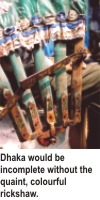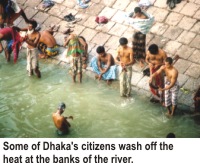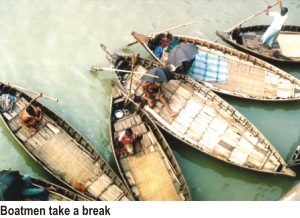|
Impressions
Out
with the
New and in
with the Old
Lally
Snow
 ‘Dhaka
is a place of last resort for the dispossessed and displaced
from the countryside.' So reads my, by now dog eared and much
thumbed through yet trusty guidebook. A modern twist on the
story of Dick Wittington and perhaps not the most positive
of introductions to the capital of a developing country and
a far cry from the usual accolades attributed to other, perhaps
more sophisticated cities around the world. ‘Dhaka
is a place of last resort for the dispossessed and displaced
from the countryside.' So reads my, by now dog eared and much
thumbed through yet trusty guidebook. A modern twist on the
story of Dick Wittington and perhaps not the most positive
of introductions to the capital of a developing country and
a far cry from the usual accolades attributed to other, perhaps
more sophisticated cities around the world.
As
a relative newcomer to the city, and Dhaka being my first
port of call, I was, and still am intrigued by it. Cities,
by their very nature, are big. They seep like a drop of ink
on blotting paper silently spreading into that place where
the land meets the sky; oblivion. Dhaka is no exception. The
other day the lofty heights of a friends eleventh floor apartment
gave me fantastic views of the city from all angles, but its
edge could not been seen and, fantastical though it may sound,
I could almost imagine it sprawling across the whole globe,
in synchrony with the low lying clouds, an endless sea of
telegraph poles, wires, high rise buildings, domes of mosques
and, of course, rickshaws. (Would Dhaka be complete without
its rickshaws?)
 I
have the misfortune of being female and European looking (and
perhaps a little naive), but down on the ground Dhaka proves
to offer a new experience every day and, if I am honest, these
experiences are sometimes not particularly enjoyable. What
first strikes the outsider is the sheer volume of noise. When
I first learnt to drive, my instructor reprimanded me on countless
occasions for playful yet illicit use of the cars' horn. '
As you can see from page 47 paragraph c of your manual,' he
would say gravely making notes with an ominous red pen, 'the
horn is only to be used as a warning to other cars who might
not see you around a narrow corner, never in anger, haste
or jest. Emergencies only.' But here, in Dhaka, anything goes.
Hoot for attention; ring in annoyance; hoot 'get out of my
way,' when words become redundant; ring to mean left or right
or straight on or all three; hoot to mean hurry up; ring to
mean slow down; hoot for fun, even. There are no rules and
if there were, rules are meant to be broken, or so the saying
goes. I
have the misfortune of being female and European looking (and
perhaps a little naive), but down on the ground Dhaka proves
to offer a new experience every day and, if I am honest, these
experiences are sometimes not particularly enjoyable. What
first strikes the outsider is the sheer volume of noise. When
I first learnt to drive, my instructor reprimanded me on countless
occasions for playful yet illicit use of the cars' horn. '
As you can see from page 47 paragraph c of your manual,' he
would say gravely making notes with an ominous red pen, 'the
horn is only to be used as a warning to other cars who might
not see you around a narrow corner, never in anger, haste
or jest. Emergencies only.' But here, in Dhaka, anything goes.
Hoot for attention; ring in annoyance; hoot 'get out of my
way,' when words become redundant; ring to mean left or right
or straight on or all three; hoot to mean hurry up; ring to
mean slow down; hoot for fun, even. There are no rules and
if there were, rules are meant to be broken, or so the saying
goes.
The
volume of traffic and pollution coincides with this noise
and likewise there does not seem to be much consistency in
driving standards. Although there are lines to indicate lanes,
a loud toot seems to take precedence over actually adhering
to these lanes and a wave of the arm in any which direction
suffices to communicate to any one interested in a desired
path. However, I am accustomed to this way of travel now.
Pollution levels, as we all know, are higher here than almost
anywhere else in the world. This combined with the general
sense of decay that seems to emanate from building projects
left unfinished in certain corners of the city, makes Dhaka
appear, to me at least, a little lost, not least pandemonic.
 But
perhaps this is all a little superficial. What really amazes,
shocks, disturbs and upsets me about Dhaka is the poverty.
Do not get me wrong, I have not just emerged from a world
where everything is safe and sure and where everyone is comfortable.
I know that poverty is rife and have seen countless limb-less
and emaciated examples of it from Laos to London. Until now,
Cambodia had the most profound sense of poverty and degradation
with its child prostitutes, numerous amputees, a prevailing
sense of loss. But
perhaps this is all a little superficial. What really amazes,
shocks, disturbs and upsets me about Dhaka is the poverty.
Do not get me wrong, I have not just emerged from a world
where everything is safe and sure and where everyone is comfortable.
I know that poverty is rife and have seen countless limb-less
and emaciated examples of it from Laos to London. Until now,
Cambodia had the most profound sense of poverty and degradation
with its child prostitutes, numerous amputees, a prevailing
sense of loss.
But
it is nothing compared to Dhaka. I saw one woman in Phnom
Penh, pick her way through the rubbish directly outside the
tourist vicinity, trying to salvage some sort of existence
from the waste of others. Just one and I was horrified. I
see that here daily and the presence of barefooted, half-naked
beggars is like no where else I have been but I am aware that
to the permanent resident this is the norm. The strangest
thing, though, for me, is the disparity of wealth. In perfect
antithesis, it is not unusual to see a surprisingly new looking
4x4 next waiting in traffic next to one of these barefooted
down and outs. Or a smart residential complex just in front
of one of the city's many shantytowns.
On
my journey into work, I have to pass a number of busy flyovers
and areas of rancid wasteland. 'So what?' you say, 'This is
Dhaka. Get over it.' But I cannot. Poverty is one thing, but
it is the overriding sense of hopelessness that prevails.
Static human lives seem to cling to the edge of the road,
some lying, some standing both un-seeing and un-doing in the
filth and squalor.
When
I first arrived in this illustrious city a friend told me
that I must go to Old Dhaka especially 'The Pink Palace,'
and it sounded intriguing. I duly read up in my faithful guide
book and set off, clearly stating to the CNG driver 'Ashan
Manzil'. Half an hour later we were outside the National Museum,
and after much gesticulation and exchange of buzzwords such
as 'Old Dhaka please,' 'Eeer, Shankharia Bazar?' 'Ummm, Burigana
River?' and 'na National Museum!' I found myself at the edge
of Old Dhaka although where exactly, I do not know.
 Instantly
noticeable was the absence of road noise. If my ears had been
ringing from the sounds of congestion, they were now ringing,
literally, from the symphony of rickshaw bells. Immediately,
I was enchanted as before me lay a maze of winding streets
and dilapidated yet romantic looking buildings not a neon
sign or high rise building in sight. I walked for a while
taking in the new array of sights and smells. Due to the relative
lack of traffic the air was filled with delicious, and to
me exotic, aromas both sweet and savoury, I passed a girl
weaving together flowers and smelt their nectar, rice sellers
measured and weighed their bounty and I heard individual grains
hit the ground amid laughs and chatter. Although I was still
an object of curiosity, people were far too busy with what
they were doing to bother with me and at last I was anonymous.
It was refreshing and I felt refreshed. Instantly
noticeable was the absence of road noise. If my ears had been
ringing from the sounds of congestion, they were now ringing,
literally, from the symphony of rickshaw bells. Immediately,
I was enchanted as before me lay a maze of winding streets
and dilapidated yet romantic looking buildings not a neon
sign or high rise building in sight. I walked for a while
taking in the new array of sights and smells. Due to the relative
lack of traffic the air was filled with delicious, and to
me exotic, aromas both sweet and savoury, I passed a girl
weaving together flowers and smelt their nectar, rice sellers
measured and weighed their bounty and I heard individual grains
hit the ground amid laughs and chatter. Although I was still
an object of curiosity, people were far too busy with what
they were doing to bother with me and at last I was anonymous.
It was refreshing and I felt refreshed.
Of
course, in New Dhaka there are signs of hope and development.
Buildings are built albeit slowly, markets prosper with the
throng of customers, and the very presence of all this traffic
is a sign of commerce to me at least. In last weeks heavy
rain I was amused, if a little bewildered, to see people carrying
on regardless of the torrent of water descending from the
heavens. Likewise in the blistering heat, umbrellas become
sunbrellas. Whatever the weather, life goes on. In contrast
when it snows in England the whole country goes into a neurotic
frenzy with roads becoming blocked and power failures; if
there are leaves on the lines (yes leaves), trains don't run;
when it is hot, the hospitals become filled with individuals
suffering from sunstroke, mild burns and dehydration; when
it rains people go without lunch for fear of getting wet.
Life does not go on.
People
have since told me that Old Dhaka is one of the most over
populated and poor places of the city and that it is usual
for buildings to collapse at random due to the lack of original
planning. In retrospect, perhaps this is evident, but at the
time, it was not. Yes, there were rubbish pickers, yes there
were signs of unchecked poverty but even above the shop fronts
life looked busy, cheerful and, well it looked hopeful. In
front of Ashan Manzil, which incidentally was closed, could
be seen the hustle and bustle of the river. Later on, from
the vantage point of the Gulistan crossing ant-like people
smiled and splashed as they washed, traded with each other
in earnest, or merely sat pensively on their boats.
From
the Gulistan crossing that afternoon, there was a break in
the clouds and I could see the tale of the two cities, and
suddenly the ending appeared more promising and optimistic.
May be, one day, Dhaka will be returned to its former glory
as a city so lusted after by Mughals and Empire builders alike.
If the younger generations can learn from their predecessors,
so too can the New learn from the Old.
Lally
Snow is a UK-based journalist interning with The Daily Star
Copyright (R)
thedailystar.net 2004
|
